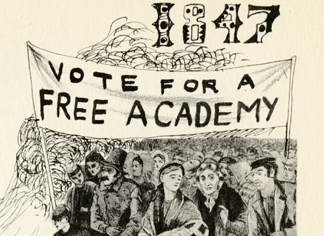1847-1945 The First Century of Public Higher Education in NYC
A dozen years before the Civil War the city of New York made a unique commitment nationally. It embraced the concept of public, tuition-free, and municipal taxpayer-supported higher education for its citizens. Approved overwhelmingly by a referendum of NYC voters, the Free Academy opened its downtown Manhattan campus in 1847 (two decades later it changed its name to The College of the City of New York [CCNY]). Its mission, in the words of one of its founders, was “to educate the children of the whole people,” who were for most of CCNY’s first century solely white middle and working-class young men. They were drawn from the city’s public schools in older immigrant neighborhoods, especially German and Irish, as well as native-born areas. The Free Academy was joined in 1870 by the Normal College of the City of New York (changing its name to Hunter College in 1914), which educated the city’s young women to become public school teachers. Despite a municipal commitment to free, public higher education for city residents, CCNY and Hunter undergraduate enrollment totaled less than three thousand full-time students as late as 1910.
The city’s dramatic population growth and ethnic transformation (especially the huge influx of Jewish immigrants from Eastern Europe) combined with pressure to increase college enrollments pushed the city’s Board of Higher Education (established in 1926) to expand the municipal system. Two new city colleges were approved by the state legislature and launched in Brooklyn in 1930 and Queens in 1937.
New York City continued to make a substantial and sustained investment of tax dollars in its public higher education system in the decades prior to World War II, covering more than 90 percent of the municipal system’s total operating budget. The city’s municipal system now counted four tuition-free senior college campuses in three of its five boroughs, all of which now admitted young men and women together, almost all of whom were white. That system would face significant demographic, financial, and institutional challenges in the postwar era that followed.
 At each historical moment, national issues manifested themselves on the college campuses and the CUNY Digital History Archive offers related items. The Struggle for Free Speech at CCNY, 1931-42 explores widespread student and faculty political activism at City College during the Great Depression. CCNY students participated in protests against militarism, social and economic injustice at home and the threat of fascism abroad. Brooklyn College - Handbills links to a collection of 279 handbills distributed by the college's student groups. The handbills cover an array of topics including war, peace, labor and Academic Freedom.
At each historical moment, national issues manifested themselves on the college campuses and the CUNY Digital History Archive offers related items. The Struggle for Free Speech at CCNY, 1931-42 explores widespread student and faculty political activism at City College during the Great Depression. CCNY students participated in protests against militarism, social and economic injustice at home and the threat of fascism abroad. Brooklyn College - Handbills links to a collection of 279 handbills distributed by the college's student groups. The handbills cover an array of topics including war, peace, labor and Academic Freedom.
[This essay is based on Austerity Blues: Fighting for the Soul of Public Higher Education, by Stephen Brier and Michael Fabricant, October 2016.]
7 Featured Items:
"The Crisis in City College"
On this cover of the December 1933 edition of the National Student League's Student Review, CCNY President Robinson is depicted in full academic regalia as a cat, following in step behind a German military officer. Robinson's tail, [...]
"Strike Tomorrow!"
The headline for this edition of Student News announces City College students' strike set for November 20, 1934. The strike was demanded the reinstatement of twenty-one expelled students as well as the removal of City College (CCNY) [...]
Teacher and Worker, April 1936
Articles on this front page of the April 1936 issue of City College's Teacher and Worker discuss a planned student "peace assembly" as well as preparations for faculty participation in the upcoming May Day Parade. This monthly campus [...]
American Student Union's "Charter of Student Rights and Responsibilities,"
Adopted at the American Student Union's (ASU) 1940 convention, this document lays out the group's main tenets, namely the belief that peace and progress must be found and cultivated at each of the nation's universities. The charter [...]
Rally on CCNY Quad, November, 20, 1934
This photograph was taken at the November 20, 1934 rally at CCNY. The demonstration was held to demand the reinstatement of twenty-one expelled students as well as the removal of college president, Frederick B. Robinson. The twenty-one were expelled [...]
"Winter Soldiers - The Story of a Conspiracy Against the Schools"
Published in 1941 by the Committee for Defense of Public Education, a joint committee of the Teachers Union and the College Teachers Union, Winter Soldiers tells the story of the Rapp-Coudert hearings and New York State's efforts to rid its [...]
Subpoena issued to the College Teachers Union
This is the subpoena that was issued to the College Teachers Union on January 27, 1941. Commanding the union's presence at a January 31st hearing before the Rapp-Coudert Committee, the document requests extensive union membership records, [...]
